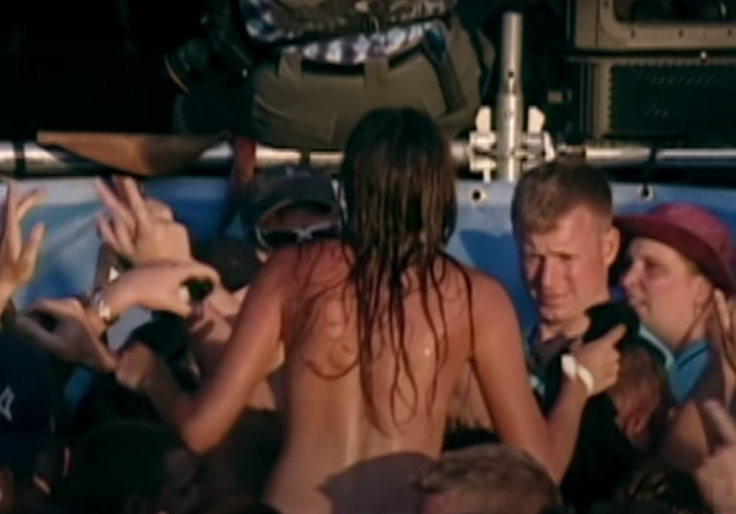Dave Matthews's quip might be the perfect assessment of Woodstock 99: "Today, there's an abundance of titties." Topless women seemed to be everywhere those three days in Rome, New York. But this wasn't the carefree, hippie nudity of 1969. This was the era of Girls Gone Wild, and women were flashing the MTV cameras on hand to record everything that happened at the festival.
The men in the crowd demanded more. They jeered, groped, and, in some cases, assaulted the women while nu-metal bands thrashed on stage and encouraged the crowd toward violence. As the festival's promoters loved to say, this was not your parents' Woodstock.
Nudity, violence, and Limp Bizkit. That's basically what you get in Woodstock 99: Peace, Love, and Rage. Directed by Garret Price, the film is the first installment in HBO Max's Music Box, a documentary series created by The Ringer founder Bill Simmons.
Despite Price's stimulating direction, Woodstock 99 feels like a concert film intercut with workaday social criticism. If you don't have an hour and fifty minutes to sit through the film, don't fret. You can largely replicate the experience by putting on a playlist of '90s music and scrolling through the feeds of your favorite Twitter scolds.
Woodstock 99 was conceived and billed as something entirely different than the Aquarian Exposition from which it drew its name. In that sense, at least, the festival was a success. In '69, people danced in the rain to Joan Baez after organizers let everyone in for free. Thirty years later, attendees were hospitalized from the heat while thrashing to Metallica and organizers charged $4 for water.
Comparing the two events, it's clear to see what went wrong with the premillennial Woodstock. Bands like Rage Against the Machine and Insane Clown Posse whipped the fenced-in, overheated, and drunk crowd into the kind of Bacchic frenzy music festivals have been known to inspire since time immemorial. Woodstock wasn't the rule but the exception, a false-start to a violent legacy of failed events stretching from Altamont to the Fyre Festival.
The attendees, performers, and music journalists interviewed in Woodstock 99 have a different take on things. They claim Woodstock 99 was a disaster because the audience consisted largely of angry, young, white men. But the same could be said about the original Woodstock, which begs the question: What changed?
The documentary doesn't offer a clear answer. The interviewees all criticize Kid Rock, Limp Bizkit, and the festival's other acts for appropriating "progressive" hip hop to give voice to some latent anger unique to American males, but stop short of blaming the acts themselves for encouraging violence, something one journalist calls "political misdirection."
Nor does the documentary make a real attempt to trace the roots of the anger that seemed to unite the audience. Music journalist Steven Hyden blames it on the "top-down era" of the 20th century, which makes about as much sense as blaming William Shakespeare for the movie Grown Ups 2: You can probably make the case, but it doesn't carry much water. At different points, the documentary blames the anger on Carson Daly, the death of Kurt Cobain, Bill Clinton, the economic prosperity of the 1990s, the cultural dominance of the Baby Boomers, and, of course, capitalism.
Toward the end of the film, pundits scramble to claim that the "white rage" that bubbled up in a Korn mosh pit somehow led to the election of Donald Trump. Of course, they don't actually attempt to explain this transmission. They just toss out lines like "a lot of that energy just wound up in chat rooms and Reddit boards in 2021" and look plaintively at the camera. We saw the signs!
When they aren't clutching their pearls about proto-Trumpism, the documentary's talking heads deliver some of the film's most unintentionally hilarious moments.
The New York Post's Maureen Callahan spends most of the film slamming the male Woodstock attendees for their violent natures, only to nod approvingly at the riots that broke out on the festival's last night. Apparently, when angry, white males "are ripping open ATM machines with their bare hands and lighting Mercedes Benzes on fire," they're not demonstrating white privilege, but protesting capitalism.
Discussing DMX leading a call-and-response where the mostly white audience sang the N-word, New York Times film critic Wesley Morris wonders about "the racial dynamic for the few nonwhite people" in attendance at the festival, particularly nonwhite women.
Unfortunately, we don't get an answer to that question, because all of the festival goers interviewed for the film are white, and most of them are men.
Angry, confused, and a little too long, Woodstock 99 is a lot like the festival itself. As with the ill-fated event, it might be best to just avoid it, Dave Matthews's observation notwithstanding.
